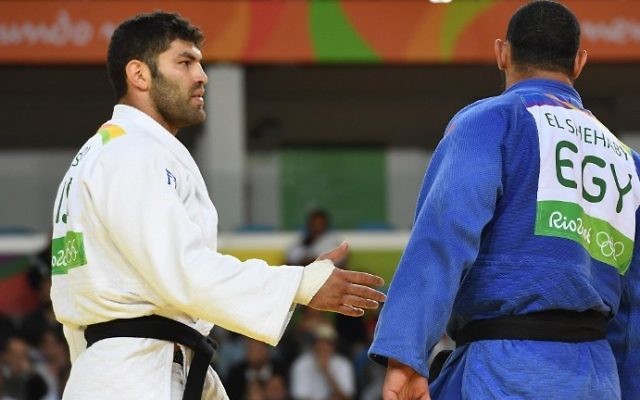Our View: Ugly in Rio

The Summer Olympics in Rio have largely achieved what we want to see at this quadrennial display of the world’s best athletes: record-setting performances, nail-biting competition, the thrill of victory, the agony of defeat, lots of Michael Phelps and Usain Bolt and American Final Five gymnasts.
The fears of Rio becoming a disaster have for the most part appeared unjustified. Sure, the diving pool turned green, and American swimmer Ryan Lochte and a few teammates were robbed, and a Belgian sailing competitor blamed a poor performance on dysentery caused by raw sewage on the Brazilian coast. While we won’t know whether these games contribute to the spread of the Zika virus until the athletes and fans go home, the science seems encouraging.
The positives in Rio make one particular negative stand out: the expression of Arab hatred of Israel.
It started on the way to the opening ceremonies Aug. 5. Someone at the International Olympic Committee naively or optimistically scheduled the delegations from Lebanon and Israel to share a bus. But the official leading the Lebanese team blocked the door, supporting athletes who refused to ride with Israelis, and the Israeli team was force to find another ride.

That Lebanese official, Saleem al-Haj Nacoula, reportedly was hailed as a hero in Lebanon even while being reprimanded by the IOC.
Two days after the bus brouhaha, the story of anti-Israel sentiment spread to the judo mats, one of the strongest arenas for the Israeli team.
A Saudi competitor, facing the prospect of a second-round match against Israeli Gili Cohen, forfeited her opening match. Israeli media reported that Joud Fahmy quit to avoid Cohen, although the Saudi team said injuries forced her to drop out.
There’s no mistaking what happened Aug. 12 when Or Sasson defeated Egyptian Islam El-Shahaby in the first round of the heavyweight judo competition. Sasson tried to show good sportsmanship by shaking El-Shahaby’s hand; the Egyptian backed away, avoided Sasson’s hand, refused to bow and was rewarded with a cascade of boos from the crowd.
Losing to an Israeli was traumatic enough that El-Shahaby said he is quitting judo. Sasson went on to win a bronze medal, matching the achievement of fellow Israeli Yarden Gerbi in the lightest women’s weight class.
Politics, of course, has no place at the Olympics. If the modern games copied the ancient Greek model more closely, athletes would compete on their own merits and without the team uniforms, flags and anthems that raise nationalist fervor along with national pride. But then most of us wouldn’t watch transfixed for more than two weeks.
It’s sad that some athletes look across the mat or stare out a bus window and focus on the uniforms that make them enemies instead of the shared competitive spirit and dedication that make them so alike. It’s also predictable that such blind hatred is directed at tiny, democratic, friendly Israel.
We can only hope that someday the world’s athletes take these words from the IOC to heart: “The goal of the Olympic Movement is to contribute to building a peaceful and better world by educating youth through sport practiced without discrimination of any kind and in the Olympic spirit, which requires mutual understanding with a spirit of friendship, solidarity and fair play.”



comments